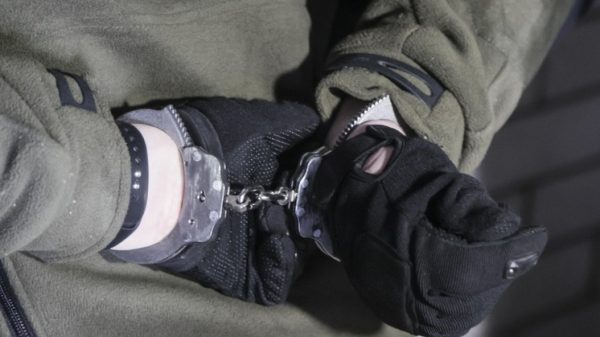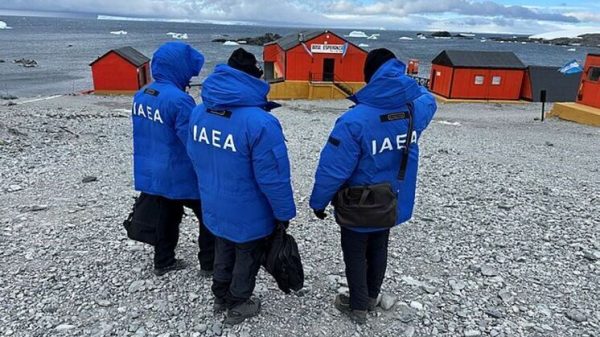Police departments in major cities across the world give their officers legal impunity to use lethal force even when their lives are not in danger, according to new research commissioned by the Guardian.
The study by the University of Chicago and its research partners found that not one police department of the cities surveyed had policies that were consistent with human rights guidelines set forth by the UN when it comes to use-of-force policies.
The report involved 48 major US and international cities, many in some of the richest, most democratic countries in the world.
This research reveals that not only are police officers in the US and beyond acting violently with impunity, but that their professional codes allow them to do so. The research comes as police forces are under intense scrutiny in the year after the brutal killing of George Floyd by Minneapolis police and the unprecedented wave of uprisings that followed.
Q&A What is the Overpoliced, underprotected series?
Show
Hide
Overpoliced, underprotected is a series focused on police violence in the US following one of the largest-scale uprisings in history.
A year on from the killings of George Floyd, Breonna Taylor and Ahmaud Arbery, there are demands both inside the government and from grassroots movements to end the systemic racism and lethal force that has been embedded in police culture for centuries.
But with stark differences in approaches to reform and revolution, and the continued power of police unions, achieving sweeping change faces more obstacles than ever.
Was this helpful?
Thank you for your feedback.
“The nation is going to be looking at this [George Floyd case] with new consciousness and awareness, but [Derek Chauvin, the officer who killed Floyd] is being prosecuted under the same old laws and the same old system,” said Sherri Williams, a professor at American University who writes about and analyzes police violence.
List of the 48 cities that were in the study. None of them have human-rights-compliant laws.
The findings by the University of Chicago Global Rights Clinic will appear in a forthcoming report, Global Impunity. In an analysis commissioned by the Guardian for our ongoing project Overpoliced, Underprotected, researchers compared a city’s written use-of-force policies with several UN documents, including the UN code of conduct for law enforcement officials, which emphasizes that lethal force should only be used when officers are faced with immediate and grave threats to their own lives or the lives of others.
The research focuses on rich and developed nations in order to compare places with comparable resources. It includes disproportionately more US cities to provide a foundation for the scope of the project.
In the US, 987 people were killed by the police in the past year. The rate is almost triple that of the neighboring Canada and 30 times that of Germany.
“The sheer number of countries, police departments in the US and across the globe that tell their police officers that you can use deadly force – shoot someone – if they are resisting arrest or running away is staggering,” said Nino Guruli, one of the authors and a staff attorney at UIC John Marshall Law School’s International Human Rights Clinic. “As if it is more important to complete an arrest or not retreat than to prevent unnecessary death and suffering.”
To analyze use-of-force policies, the researchers used an evaluation scale based on four categories: whether a city’s use of lethal force is considered legal under international law; whether lethal force can be used only for an immediate threat and only as last resort; whether it can be used only in response to an equally deadly threat; and whether police are accountable to an independent oversight body for the use of lethal force.
In 13 cities, the research found, officers are permitted to use lethal force even if they have not exhausted all the other options available to them, such as de-escalation tactics.
Cities that have less stringent use of force policies.
In Denver, for instance, officers are allowed to use lethal force to arrest or prevent an escape of an individual based on past crime – without any requirement that the suspect pose a present and immediate threat:
105.2. A peace officer is justified in using deadly physical force … only when he reasonably believes that it is necessary: b. To effect an arrest or prevent the escape from custody, of a person whom he reasonably believes: 1. Has committed or attempted to commit a felony involving the use or threatened use of deadly weapon
Such policies often come under increased scrutiny during highly public police brutality cases. The murder of Eric Garner – a New York man choked to death during his arrest – spurred a ban on chokeholds in the state after protests erupted across the country. Similarly, with the deaths of Floyd and Elijah McClain, who was also killed last year, civil rights lawyers have called into question whether police were acting under some kind of threat to their own lives.
In 25 cities, officers are permitted to use deadly force in response to a lesser threat, or when there is no immediate threat.
Charts showing where officers are permitted to use deadly force in response to a lesser threat.
This can vary dramatically. Philadelphia has clear language prohibiting police officers from using deadly force if there is no longer an “objectively reasonable belief that the suspect is dangerous, even if the deadly force could have been justified at an earlier point in time”. But in Indianapolis, the policy is far more opaque, only requiring a “threat of deadly force” to act.
Accountability for the use of lethal force is also often lacking. The researchers found that many police departments across the world don’t require police to report when they use excessive force – even when it is deadly. This leads to both a lack of accountability for the use of lethal force among police forces and also a gap in the public’s understanding of what happened, due in large part to the lack of adequate documentation.
Only eight cities require internal reporting of an officer who uses deadly force, and 16 cities require that reporting when it results in a death or injury.
Cities that have less stringent reporting policies after officers use force.
Richard Aborn, president of the Citizens Crime Commission of New York City, said the lack of reporting requirements can be dismal. “It’s what message the police agency leadership sends.
“I think if we just did that – disciplined those cases – we wouldn’t need to change these policies.”
But if the cities are unlikely to report their use of force internally, reporting these incidents externally feels even harder to enforce.
Cities that have less stringent reporting policies after officers use force.
“Laws and policies are critical to government accountability and transparency. This is especially true in the area of law enforcement where the state is granted the power to end human life,” said Claudia Flores, report author and associate clinical professor of law and director of the Global Human Rights Clinic at the University of Chicago Law School.
Campaign groups are advocating a range of reforms. The demands include curbing the unchecked power of police unions, which often help create the use of force policies themselves, and requiring community oversight of negotiations within the contracts.
“We have historical amnesia about how we really treat people in this country,” said Williams. “We’re acting like we don’t really know [these policies] were designed to do what they’re doing.”
The research revealed – which may come as a surprise to those focusing on police brutality and systemic racism in the US – that New York City actually had the strongest policies and guidelines on excessive use of force, followed by Mexico City and Buenos Aires. Meanwhile, Riyadh, Mumbai and Paris occupied the lowest rankings on the list.
But that doesn’t necessarily mean the top cities have better police departments, or fewer extrajudicial killings. A more comprehensive policy doesn’t always denote accountability, or the power of law to enforce such a policy.
In the past year it has become increasingly clear that the power of police forces has gone unchecked for far too long. Since then, government and grassroots voices in the US have been demanding an end to centuries of racist and poor policing practices and policies.
In early March, the US House of Representatives voted on one of the most comprehensive police reform bills in the history of the country: the George Floyd Justice in Policing Act. The legislation – which is unlikely to pass the Senate owing to Republican opposition – includes several sweeping changes to how police do their jobs, including a ban on chokeholds.
These US cities defunded police: ‘We’re transferring money to the community’
Read more
This year, the UN also convened a group of experts on the use of force. They called on the US to adopt wide-ranging reforms and end police brutality. They admonished police departments for using teargas and other harsh measures on protesters and recognized the increasing militarization of US police weapons.
“Policing reforms must adopt genuine and substantive measures to dismantle systemic racism in policing, including against racial, ethnic and other minorities, by divestment from current policing budgets and reinvestment in alternative social and economic resources that are vital for the safety of these communities,” they stated.
But those reforms in policies, and in laws, may come too late for the case that will determine whether the former police officer Derek Chauvin will be held accountable for kneeling on George Floyd’s neck for more than eight minutes.
“Last summer was a summer of conversation,” said Johnetta Elzie, a civil rights activist and co-founder of Campaign Zero, an advocacy and research group focused on ending police brutality. “Now it depends on who and what entity cares enough to hold the police and police unions accountable.”
Global Impunity will be published in May and is authored by Claudia Flores, associate clinical professor of law and director of the Global Human Rights Clinic at the University of Chicago Law School; Nino Guruli, staff attorney, UIC John Marshall Law School, International Human Rights Clinic; Brian Citro, human rights lawyer and independent researcher; Mariana Olaizola, fellow and faculty, Global Human Rights Clinic at the University of Chicago Law School; and Chelsea Kehrer and Hannah Abrahams, students, University of Chicago Law School




















































Свежие комментарии